

HRIC makes regular submissions to UN Special Procedures that includes Special Rapporteurs or Independent Experts, and Working Groups—with mandates to report and monitor human rights from a thematic or country-specific perspective. HRIC’s submissions highlight concerning developments that represent serious deterioration in fundamental rights in mainland China and the Hong Kong SAR, including issues relating to the independence of judges and lawyers; torture and other cruel, inhuman or degrading treatment or punishment; the rights to freedom of peaceful assembly and of association, the promotion and protection of freedom of opinion and expression, and the right to education and academic freedom.
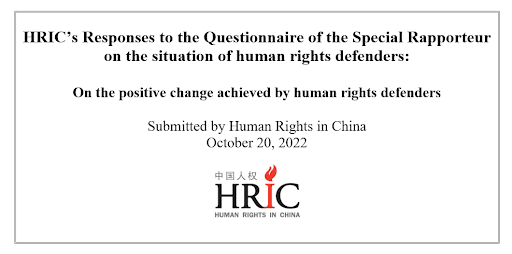
Provided input into the next thematic report by the mandate on the positive change achieved by human rights defenders, to be presented to the UN Human Rights Council in March 2023. In repressive and risk-laden environments, HRIC underscored that the definition of “victory” must also include speaking out and publicly asserting the rights that are protected under China’s domestic law and international law and described three examples each of rights defenders in mainland China and the Hong Kong SAR who have contributed to positive change: (1) mainland China: HUANG Xueqin and Chinese Feminists, COVID-19 Claims Legal Advisory Group, and Peng Lifa and other defenders; and (2) Hong Kong: rights activist CHOW Hang-tung, former journalist Gwyneth HO Kwai-lam, and former journalist BAO Choy yuk-ling.
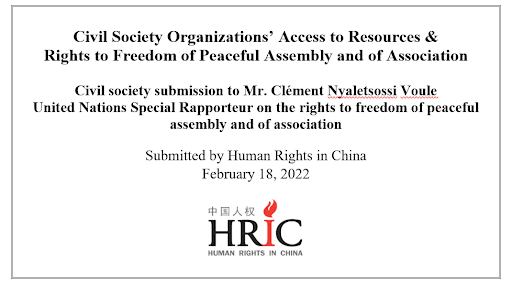
Provided input into a thematic report by the mandate pertaining to the study of trends, developments, and challenges regarding the ability of civil society organizations (CSOs) to access resources, including foreign funding. HRIC’s submission focused on civil society organizations in the Hong Kong Special Administrative Region (HKSAR or Hong Kong) and highlighted concerns regarding: (1) state practices affecting the ability of civil society organizations to access resources, including impact of the implementation of National Security Law for Hong Kong and other HK laws on deregistration of CSOs and closure of media outlets and teachers and students’ unions; and (2) constraints posed by donor requirements that have intensified CSO operational challenges. Advanced recommendations for states to comply with their obligations to ensure a safe and enabling civil society environment, including access to resources.
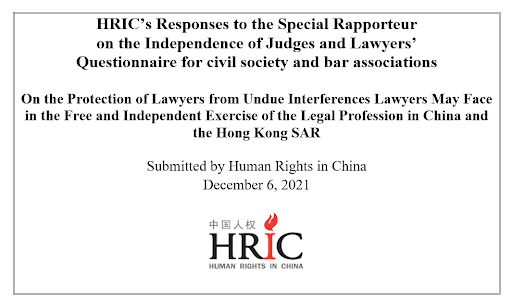
Highlighted concerns regarding the comprehensive political oversight and control over lawyers and bar associations implemented through specific legal and policy measures that undermine the formal and functional independence of the legal profession in mainland China and in the HKSAR.
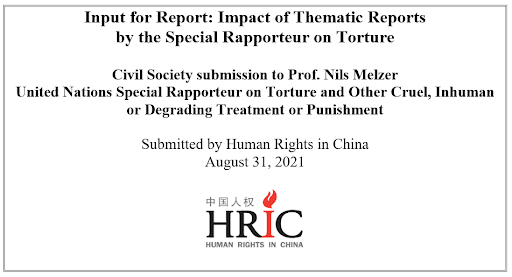
Provided input into the thematic report by the Special Rapporteur on Torture and Other Cruel, Inhuman or Degrading Treatment or Punishment (SRT) on the global impact analysis of the mandate’s thematic reports as a driver of change in laws, policies, and practices towards the eradication of torture and ill-treatment. Focused on: (1) extra-custodial use of force in Hong Kong, (2) corruption-related torture and ill-treatment mainland China, (3) psychological torture in Xinjiang, and (4) the effectiveness of the cooperation of China with the mandate holder. HRIC concluded that the SRT’s important recommendations have had limited impact on PRC’s laws, policies, and practices; and advanced suggestions for strengthening the future impact of the SRT’s recommendations.
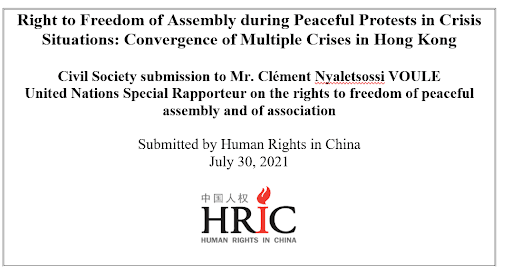
Provided input into the next thematic report by the mandate, specifically addressing the protection of human rights in the context of peaceful protests during crisis situations. Described how the convergence of multiple crises—the COVID-19 pandemic health crisis, ongoing political and social crisis intensified by legal developments, and a drastic electoral overhaul in Hong Kong—have contributed to the severe, ongoing rights restrictions in Hong Kong, including on the right to freedom of peaceful assembly. Also described creative resistance and practices by civil society, and advanced suggestions for positive steps and specific measures for the Special Rapporteur.
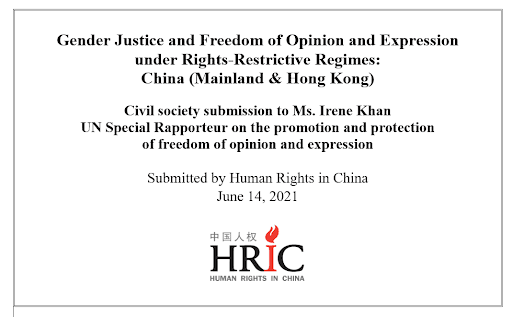
Provided input into the next thematic report by the mandate within the context of the feminist framework and intersectional lens adopted by the Special Rapporteur, broader social and economic inequalities, national security laws, and China’s expanding digital authoritarianism. Described issues relating to (1) mainland Chinese and Hong Kong women defenders in the public sphere, including rights restrictions, abuses, and violations during COVID-19; (2) targeting of women who resist traditional roles and norms; and (3) online attacks on women and girls who participated in the2019 social protest movement in Hong Kong. Advanced recommendations for the Chinese government and the Special Rapporteur.
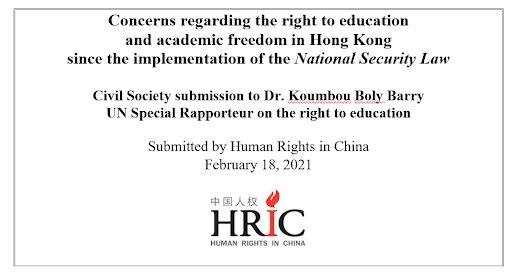
Provided information and raised concerns regarding the erosion of the right to education and academic freedom in Hong Kong since the imposition of the National Security Law (NSL) by the Central People’s Government (CPG) in Hong Kong. Highlighted the alarming expansion of attacks on these rights within an environment of steeply increasing securitization including: (1) the suppression of speech and other forms of expression in schools, (2) the disproportionate disciplining of educators, (3) self-censorship in the academic community, and (4) the revamping of a high school core subject—Liberal Studies—to remove critical thinking. Advanced suggestions for the Special Rapporteur.
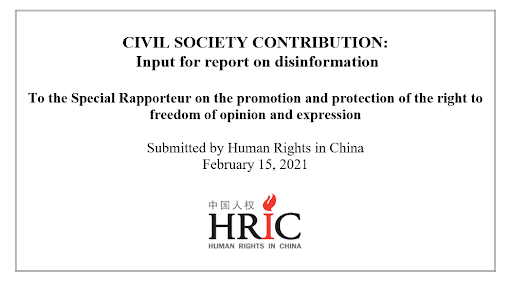
Focused on the human rights challenges posed within a system of pervasive censorship and information control in China, specifically when misinformation is created and disseminated by the state itself or by state-supported actors. Provided specific examples of misinformation created and disseminated by the Central People’s Government (CPG) and the Hong Kong SAR government, as well as by state-controlled or supported actors; and raised concerns regarding the adverse impact of misinformation and propaganda on the legitimate exercise of human rights. Advanced constructive recommendations for monitoring and promoting compliance of state actors with their international human rights obligations, including standards regarding the obligation to “disseminate reliable and trustworthy information, including about matters of public interest, such as the economy, public health, security and the environment.”
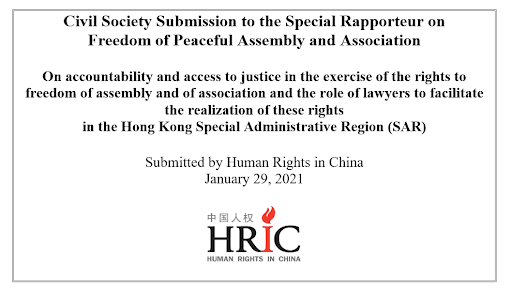
Raised concerns over developments in the Hong Kong Special Administration Region (HKSAR) that adversely affected the exercise of the rights to freedom of assembly and of association, including (1) the increasing targeting of Hong Kong lawyers and their associations in crackdowns and arrests; (2) the disconnect between legal provisions that ensure a right to an effective remedy for abuses of protected rights and actual practice; and (3) restrictions on peaceful assemblies being used, explicitly or implicitly, to stifle expression of political opposition. Underscores the need for training of Hong Kong Police Force on appropriate use of force and the need for the international community to provide assistance to legal practitioners in Hong Kong.